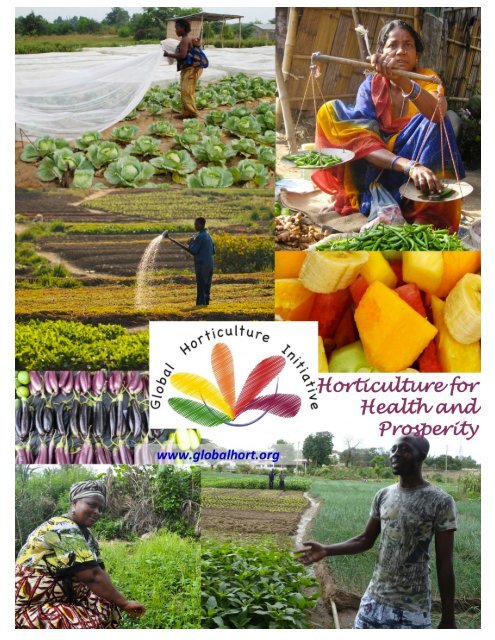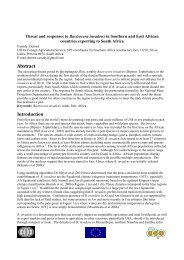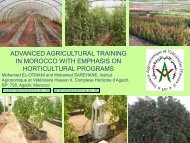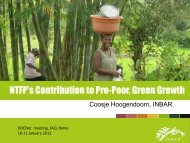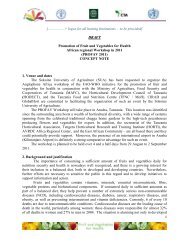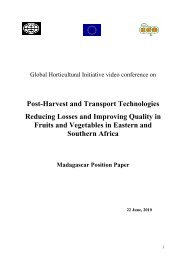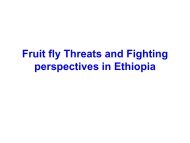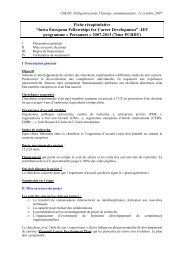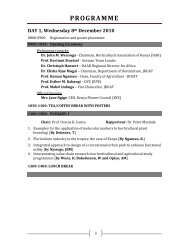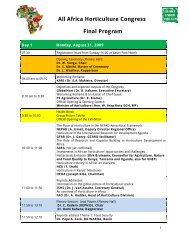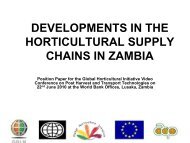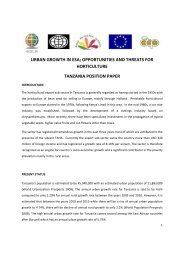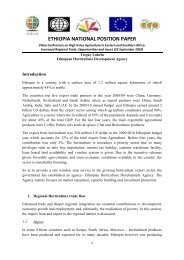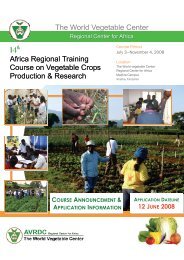GlobalHort Leaflet O.. - The Global Horticulture Initiative
GlobalHort Leaflet O.. - The Global Horticulture Initiative
GlobalHort Leaflet O.. - The Global Horticulture Initiative
Create successful ePaper yourself
Turn your PDF publications into a flip-book with our unique Google optimized e-Paper software.
Advocating for greater support of <br />
‘H4D’ initiatives worldwide <br />
THE ALL AFRICA HORTICULTURE CONGRESS (AAHC) 2009 AND 2012 <br />
<strong><strong>Global</strong>Hort</strong> facilitated the emergence and the spirit of an all Africa horticulture event run by and for the African community of horticulturists. This first continental <br />
congress in 2009 gathered a full array of stakeholders of the horticulture sector in Nairobi, Kenya. It was placed under both <br />
regional (East African countries) and international auspices with the sponsorship and support of <strong><strong>Global</strong>Hort</strong> and the <br />
International Society for <strong>Horticulture</strong> Science (ISHS). <strong>The</strong> resolutions arising from this congress were supported by African and <br />
international organizations: NEPAD, ISHS and FAO in particular. <strong>The</strong> second AAHC was held in 2012 in South Africa. Again, <br />
<strong><strong>Global</strong>Hort</strong> played a facilitator’s role in the organization of information side events and in the production of resolutions: <br />
1. Promotion of fruits and vegetables for heath (PROFAV/PROFEL) <br />
2. How horticulture contributes to a secure food city supply (FAO initiatives: Growing Greener Cities, Status of Urban <br />
and Periurban <strong>Horticulture</strong> in Africa, Food for the Cities) <br />
3. Horticultural biodiversity: How it can nurture and nourish Africa in the 21 st century (Diversity for Development <br />
Alliance supported by GFAR, Save and Grow concept promoted by FAO) <br />
4. Higher education in horticulture in Africa: How can the scientific community mobilize the policy makers (TEAM-‐<br />
Africa promoted by Agrinatura) <br />
<strong>The</strong> Congress voted for the Horticultural Society of Nigeria to host the AAHC in 2016 in Lagos, Nigeria, in co-‐organization with Ghana. <br />
http://www.globalhort.org/news-‐events/all-‐africa-‐horticulture-‐congress/ <br />
PROMOTION OF VEGETABLES AND FRUIT FOR HEALTH (PROFAV/PROFEL) SINCE 2007 <br />
<strong>The</strong> 2012 Annual Meeting of the Ghana Institute of Horticulturalists (GhIH) used the PROVAF theme to boost the <br />
intersectorial partnership among Agriculture, Health and Education. FAO, WHO and <strong><strong>Global</strong>Hort</strong> were present to <br />
follow up the recommendations from the PROFAV regional workshop of 2011 in Arusha, Tanzania. A similar <br />
workshop PROFEL was organized for francophone tropical Africa in 2007 in Yaoundé, Cameroon. -‐ <strong>The</strong> overriding <br />
aim is to promote health through improved nutrition, diet/crop diversification and production/handling practices. <br />
http://www.globalhort.org/network-‐communities/horticulture-‐health/ <br />
“HORT FOR DEV” SYMPOSIUM AT THE 28TH INTERNATIONAL HORTICULTURAL CONGRESS (IHC) IN LISBON <br />
<strong><strong>Global</strong>Hort</strong> and KARI (Kenya) were co-‐convened the <strong>Horticulture</strong> for Development Symposium at the Congress. <br />
<strong><strong>Global</strong>Hort</strong> is proud of the fact that there was a <strong>Horticulture</strong> for Development symposium incorporated into the Lisbon <br />
IHC – the first time that this topic has been so prominently <br />
featured by the ISHS. This initiative was very much <br />
supported by ISHS leadership and is in the same spirit as <br />
the move to support regional Congresses in Africa and Asia <br />
between each IHC. <strong>The</strong> Proceedings have been published <br />
in a volume of Acta Horticulturae (N°921) available at http://www.actahort.org/books/921/index.htm <br />
PROVIDING LEADERSHIP OF THE DIVERSITY FOR DEVELOPMENT ALLIANCE <br />
(D4D) 2011 AND 2012 <br />
Future Plans<br />
Preparation for events:<br />
• GCARD2012, Punta del<br />
Este, Honduras<br />
• IHC2014, Brisbane,<br />
Australia<br />
• AAHC2016, Lagos, Nigeria<br />
<strong><strong>Global</strong>Hort</strong> and a number of other international organizations and agencies with a common interest in <br />
promoting agrobiodiversity attended brainstorming workshops in 2011 and 2012. <strong>The</strong>se organizations <br />
champion plants and crops they consider as neglected or under-‐utilized <br />
within the context of achieving important international development <br />
goals. From the latest workshop in Rome arose the Diversity for <br />
Development Alliance (D4D) and an action plan that included <br />
publications and advocacy during the <strong>Global</strong> Conference on Agricultural <br />
Research for Development (GCARD II) in 2012, Uruguay <br />
http://www.globalhort.org/activities/advocacy/ <br />
Publication for scientific papers<br />
and advocacy<br />
Policy briefs on agrobiodiversity,<br />
nutrition and food city supply
Connecting and informing the <br />
diverse and dispersed community <br />
of ‘H4D’ professionals <br />
<strong><strong>Global</strong>Hort</strong> Resources www.globalhort.org <br />
A Web portal freely offering knowledge products to the horticulture <br />
for development community: <br />
• Search engine focused on databases from specialized <br />
partners in horticulture and nutrition <br />
• E-‐Newsletter to a mailing list of over 1,000 recipients <br />
• Hosts pages for special interest groups like Urban <br />
<strong>Horticulture</strong> or <strong>Horticulture</strong> for Health <br />
• NEW-‐ <strong><strong>Global</strong>Hort</strong> Image Library -‐ a bilingual (English and French) <br />
central repository of high-‐resolution “creative commons licensed” images/ <br />
digital objects including photos, tables, and other illustrative material that <br />
can be used by our partners and others to help promote H4D <br />
And Links to partners’ knowledge tools: <br />
• African Crop Calendar Database (FAO) <br />
• <strong>Global</strong> <strong>Horticulture</strong> Knowledge Bank (HortCRSP) <br />
• <strong>Global</strong> Map of Horticultural Projects (HortCRSP) <br />
• Hortivar (FAO) <br />
• NewCrops (Purdue) <br />
• Plantwise (CABI) <br />
Future Plans<br />
Work more closely with our<br />
partners:<br />
• Shared platform<br />
• Joint photo database<br />
• Joint calendar of events<br />
• Joint mailing list<br />
Enhanced web portal with<br />
interactive sites<br />
Connecting and informing the <br />
Network of regional website<br />
managers (Africa)<br />
diverse and dispersed community<br />
Joint editorial board for<br />
of ‘H4D’ professionals <br />
additional e-newsletters (AAHC,<br />
PROVAF, Tertiary Education)
Facilitating research for development <br />
projects addressing key constraints to <br />
achieving the <strong><strong>Global</strong>Hort</strong> mission <br />
BioNetAgro <br />
<strong><strong>Global</strong>Hort</strong> partner, <strong>Horticulture</strong> CRSP, has co-‐funded this project that studies low cost pest <br />
exclusion and microclimate modification technologies for small-‐scale vegetable growers in East <br />
and West Africa. A Tanzanian company, A to Z Textile Mills, member of a large consortium <br />
partners, is designing and manufacturing specific Agrinets so that farmers can use them to cover <br />
horticultural crops and prevent them from pest attacks. Agrinet technology is being monitored <br />
and evaluated to verify that changes brought by the nets over the vegetable crops are cost-effective<br />
and environmentally friendly. <br />
http://www.bionetagro.org/ <br />
REGIONAL POSTHARVEST TRAINING CENTER IN SUB-‐SAHARAN AFRICA <br />
This unique pilot project, funded by <strong>Horticulture</strong> CRSP, will combine a wide <br />
variety of training programs, adaptive research and demonstrations of <br />
postharvest services. It will also provide access to needed tools and supplies in <br />
order to reduce postharvest losses and improve market access and incomes for <br />
smallholder women farmers in Tanzania. <strong>The</strong> project site in Tanzania, at the <br />
World Vegetable Center's regional office in Arusha (AVRDC-‐RCA), will serve as <br />
a model for postharvest development in five additional Sub-‐Saharan countries, <br />
whose representatives will participate via collaboration with African partners. <br />
By the close of project, 30 postharvest specialists from the six countries <br />
involved in Sub-‐Saharan Africa will be well qualified to implement enhanced <br />
postharvest handling techniques. <strong>The</strong>y will be charged to teach these techniques to approximately 1,000 women farmers in their <br />
home countries. <br />
http://www.postharvest.org/ <br />
RECIPES FOR SUCCESS <br />
This <strong><strong>Global</strong>Hort</strong>-‐funded and <strong><strong>Global</strong>Hort</strong>-‐coached one-‐year project aimed to <br />
improve health and nutrition through the greater production and <br />
consumption of under-‐utilized indigenous African fruits and vegetables. <br />
“Recipes for Success” was <br />
coordinated by Crops for the <br />
Future and involved three <br />
countries in West and East Africa <br />
(Kenya, Tanzania and Benin). <br />
<strong>The</strong> central piece of this project <br />
was the establishment of “Health <br />
Clubs”. <strong>The</strong>se are community-‐run <br />
resource centers, where farmers <br />
could receive information about <br />
healthy eating habits, learn <br />
about cookery and food processing and get advice on indigenous fruit and <br />
vegetable species. Here they could access information about production and <br />
market opportunities and purchase quality seed of priority species. <br />
http://www.globalhort.org/activities/research-‐grants/recipes-‐success/ <br />
Future Plans<br />
Use the potential of FAO to<br />
enable the environment of<br />
netting in small-scale<br />
horticulture<br />
Partnership in postharvest<br />
technologies with <strong>Horticulture</strong><br />
CRSP’s Centers of Excellence<br />
initiative<br />
Incorporate consumers' needs<br />
and education in future<br />
proposals, school based<br />
programs in particular
Building the indigenous human capacity <br />
required to support smallholders <br />
investing in horticultural enterprise <br />
HIGHER EDUCATION IN HORTICULTURE FOR DEVELOPMENT <br />
Higher education, covering academic curricula and professional training on <br />
horticulture in Africa, was discussed during a side event at the AAHC2012, <br />
and <strong><strong>Global</strong>Hort</strong> was mandated to map the present situation. <strong>The</strong> networks <br />
of ANAFE (African Network for Agriculture, Agroforestry and Natural <br />
Resources Education), RUFORUM (Regional Universities Forum for Capacity <br />
Building in Agriculture), FARA (Forum for Agricultural Research in Africa) <br />
and <strong><strong>Global</strong>Hort</strong> have worked together to produce and send out a <br />
questionnaire focusing on existing capacities in Africa. <strong>The</strong> results were <br />
presented at the TEAM-‐Africa workshop in Wageningen and published in <br />
Chronica Horticulturae (June 2012). <br />
A “Higher Education for Development in <strong>Horticulture</strong>: An International <br />
Seminar” was held at AgroCampus, Angers, France, June 2012 in synergy <br />
with the 2nd Symposium on <strong>Horticulture</strong> in Europe (SHE2012). This seminar stimulated exchanges and experiences among <br />
universities in developing countries, and compared them with universities in Europe, North America and Australia. A series of <br />
applied actions from this seminar was approved, including the maintenance of an active network, the updating and improvement <br />
of the 2012 survey, and the preparation of project proposals such as EDULINK (2012). <br />
http://www.globalhort.org/activities/capacity-‐building/ <br />
VIDEOCONFERENCES ON HIGH VALUE MARKETS IN AFRICA <br />
During 2010 <strong><strong>Global</strong>Hort</strong> was mandated by <strong>The</strong> World Bank to coordinate a series <br />
of 7 seminars on topics related to <br />
regional trade of horticultural produce in <br />
Eastern and Southern Africa (part of EU-‐<br />
AAACP funded program). <strong>The</strong> network <br />
thus established, involving National <br />
Coordinators and <strong>Global</strong> Development <br />
Learning Centers, is being used to identify <br />
constraints and develop national <br />
strategic plans for horticulture industry <br />
development. <strong>The</strong> first identified constraint is the lack of information for <br />
assuring the supply of fresh fruits and vegetables for Africa’s rapidly growing <br />
cities. <br />
http://www.globalhort.org/activities/regional-‐coordination/ <br />
Future Plans<br />
Promote the Agrinatura<br />
European curriculum for<br />
International Master and<br />
Doctorate Degrees<br />
Partner with FAO to develop a<br />
methodology for<br />
characterizing fruit and<br />
vegetable city supply in the<br />
region<br />
Develop regional innovation<br />
platforms in Africa
Mission of <strong><strong>Global</strong>Hort</strong> –‘H4D’ <br />
<strong>Horticulture</strong> for Development <br />
To create wealth and improve human health and wellbeing in <br />
the world’s poorest countries through increased production, <br />
consumption, processing and marketing of fruits and <br />
vegetables and other horticultural crops <br />
CORE ACTIVITIES <br />
Ø Advocating for greater support of ‘H4D’ initiatives worldwide <br />
Ø Connecting and informing the diverse and dispersed <br />
community of ‘H4D’ professionals <br />
Ø Facilitating research for development projects addressing key <br />
constraints to achieving the <strong><strong>Global</strong>Hort</strong> mission <br />
Ø Building the indigenous human capacity required to support <br />
smallholders investing in horticultural enterprise <br />
Board Chair <br />
Norman E. Looney <br />
Board Members <br />
Remi Kahane <br />
Past President – International Society for Horticultural Science <br />
Principal Scientist Emeritus <br />
Pacific Agri-‐Food Research Centre <br />
Summerland, B.C.V0H 1Z0 CANADA <br />
Tel: (1) 250-‐494-‐6361 <br />
norman.looney@agr.gc.ca <br />
Executive Secretary <br />
Remi Kahane <br />
<strong><strong>Global</strong>Hort</strong> <br />
c/o FAO-‐AGP <br />
Via delle Terme di Caracalla <br />
00153 Rome, ITALY <br />
Tel: (39) 0657053139 <br />
globalhort@globalhort.org


